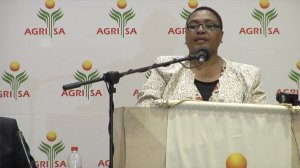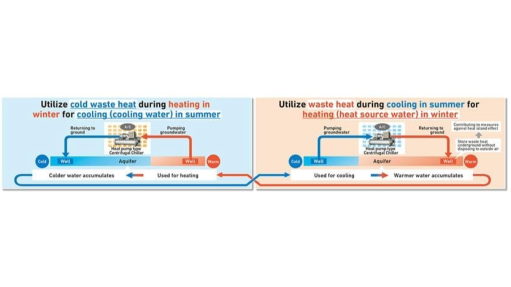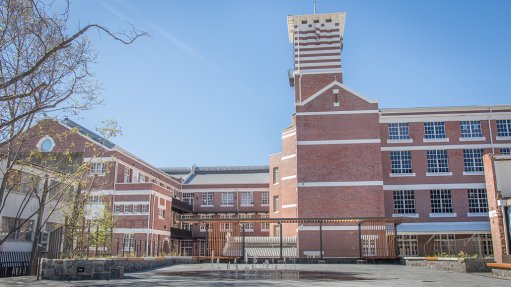Agri SA, Minister agree on need for partnerships to advance growth

Agriculture Minister Thoko Didiza discusses what the sector needs to grow and Agri SA president Dan Kriek shares his view on land reform policy
With stagnant economic growth and an unemployment rate of about 29%, the pressure is increasing on the agricultural sector to contribute more to gross domestic product (GDP) and live up to its potential in the country.
However, the sector is facing its own challenges, including policy uncertainty in terms of land reform; safety and security issues; and the impact of climate change, industry organisation Agri SA president Dan Kriek pointed out on Thursday.
“In times of uncertainty, the farming community goes into protection mode, while market forces call for progress and growth. Leaders of organisations and provincial government find it extremely difficult to deal with the emotions and fears of people in uncertain times,” he told delegates at the organisation’s annual congress.
Kriek further said that although he believed land reform is absolutely necessary, he did not advocate changing Section 25 of the Constitution to allow expropriation without compensation.
He stated that the amendment would be against international law and that there was no legal or technical reason to amend the Constitution on this matter.
“Let us rather form partnerships to normalise society and propel the country towards economic growth. We do not need ‘special masters’ to help do what we need to do,” he added.
Kriek said the first step towards making the agriculture sector grow was to work on providing financing solutions for new farmers.
He noted that embracing the Fourth Industrial Revolution (4IR) would also help farmers get out of protection mode and into growth mode.
Agriculture, Land Reform and Rural Development Minister Thoko Didiza admitted that the agriculture industry was plagued by negative growth, which was exacerbated by the oubreak of disease among animals and farm security issues.
However, she said agriculture was a business that could survive even the toughest of times. “It remains a critical sector in our country that provides food security for the nation and has the largest capacity to employ people, while contributing directly and indirectly to GDP.”
Didiza noted that agriculture had played an important role in industrialisation globally, its contribution in the economy not only being measured in primary production, but permeating in a number of processes down the value chain.
She mentioned that the African Continental Free Trade Area would result in significant opportunities for the sector to trade and export goods, while digitisation could be used to maximise South Africa’s competitive advantage.
Agri chemical and seed company Corteva Agriscience business platforms executive VP Rajan Gajaria, meanwhile, stated that there was one trait that all farmers had inherently, which was optimism.
He further spoke about the three pillars of 4IR, including the consumer, convergence of technology and collaborations.
“The consumer of today expects cleaner labels, healthy food supply, to know the food’s story, to produce less food waste and environmental sustainability. All the innovation that is going to happen in 4IR has got to be aimed at earning the consumer’s trust.
“The convergence of technology entails integrated solutions that are focused on sustainability, from crop protection and nitrogen management solutions; natural products and biologicals; germplasm and seed applied technology; digital solutions; and targeted breeding,” said Gajaria.
He added that farmers now had to harness technology to manage problems that were happening now and could happen in ten years’ time.
Gajaria further mentioned that the third pillar of 4IR was market-driven collaborations, which was the best way to solve a problem, be it through collaboration between companies and society, or the public and private sectors.
Comments
Press Office
Announcements
What's On
Subscribe to improve your user experience...
Option 1 (equivalent of R125 a month):
Receive a weekly copy of Creamer Media's Engineering News & Mining Weekly magazine
(print copy for those in South Africa and e-magazine for those outside of South Africa)
Receive daily email newsletters
Access to full search results
Access archive of magazine back copies
Access to Projects in Progress
Access to ONE Research Report of your choice in PDF format
Option 2 (equivalent of R375 a month):
All benefits from Option 1
PLUS
Access to Creamer Media's Research Channel Africa for ALL Research Reports, in PDF format, on various industrial and mining sectors
including Electricity; Water; Energy Transition; Hydrogen; Roads, Rail and Ports; Coal; Gold; Platinum; Battery Metals; etc.
Already a subscriber?
Forgotten your password?
Receive weekly copy of Creamer Media's Engineering News & Mining Weekly magazine (print copy for those in South Africa and e-magazine for those outside of South Africa)
➕
Recieve daily email newsletters
➕
Access to full search results
➕
Access archive of magazine back copies
➕
Access to Projects in Progress
➕
Access to ONE Research Report of your choice in PDF format
RESEARCH CHANNEL AFRICA
R4500 (equivalent of R375 a month)
SUBSCRIBEAll benefits from Option 1
➕
Access to Creamer Media's Research Channel Africa for ALL Research Reports on various industrial and mining sectors, in PDF format, including on:
Electricity
➕
Water
➕
Energy Transition
➕
Hydrogen
➕
Roads, Rail and Ports
➕
Coal
➕
Gold
➕
Platinum
➕
Battery Metals
➕
etc.
Receive all benefits from Option 1 or Option 2 delivered to numerous people at your company
➕
Multiple User names and Passwords for simultaneous log-ins
➕
Intranet integration access to all in your organisation



















